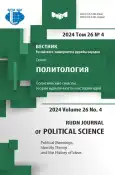The Constitution as an Object of Political Analysis
- Authors: Belozerov V.K.1
-
Affiliations:
- Moscow State Linguistic University
- Issue: Vol 26, No 4 (2024): Political Meanings, Identity Theory and the History of Ideas
- Pages: 619-629
- Section: THEORY AND PRACTICE
- URL: https://journal-vniispk.ru/2313-1438/article/view/322396
- DOI: https://doi.org/10.22363/2313-1438-2024-26-4-619-629
- EDN: https://elibrary.ru/VGYHPU
- ID: 322396
Cite item
Abstract
The constitution is typically the primary political and legal act of the state and is a subject of study for representatives of a variety of scientific disciplines. The political science community’s attention to the document remains minimal. Meanwhile, the constitution serves as a valuable source of information. Working with the constitution, one can develop an objective understanding of the state, its origins, current situation, and possibilities for its political course within the country and on the international stage. These circumstances indicate that the constitution is a crucial subject for political science analysis. At the same time, the constitution is an accessible and open document; as a result, there is a risk of its superficial perception due to ignoring several circumstances. This article highlights the fact that numerous interpretations of the term “constitution” have emerged in Russian and international sociopolitical and scientific discourse. There are also alternative state constitutions. The constitution serves to legalize and legitimize the political order, particularly in emergency situations resulting from a change of power. In this regard, it is important to identify essential political clauses of state constitutions. The possibility of discovering evidence of the nation’s identity in the constitution, as well as a solid genetic relationship between the present and the past and future, is critical to comprehending its political relevance. When connecting the principles enshrined in the constitution, it is vital to consider the declarative nature of the document’s provisions as well as their futuristic orientation toward the development of the future. When examining the state constitution, it is essential to consider the broad event, chronological, and other contexts, rather than a simplistic interpretation of its contents.
Keywords
About the authors
Vasily K. Belozerov
Moscow State Linguistic University
Author for correspondence.
Email: vk_belozerov@mail.ru
ORCID iD: 0000-0003-4875-5878
Doctor of Sciences (Politics), Professor, Head of the Department of Political Sciences
Moscow, Russian FederationReferences
- Aliyev, F.Z., Mezhuev, B.V., & Rudakov, A.B. (еds.). (2021). The basic law of Russia: The greatness of the country and the dignity of citizens. Rybinsk: Mediarost. (In Russian).
- Andreeva, G.n. (еd.). (2008). The concept of “economic constitution”: Modern research: collection of Scientific Papers. Moscow: InIon RAS. (In Russian).
- clausewitz, c. (1858). Unsere Kriegsverfassung. Zeitschrift für Kunst, Wissenschaft und Geschichte des Krieges, 104(7), 41–67.
- dahrendorf, R. (1992). Der moderne soziale Konflikt. Essay zur Politik der Freiheit. Stuttgart: deutsche Verlags- Anstalt.
- Frolova, o.e. (2018). constitution of the RSFSR of 1918: Linguistic portrait of the text. Bulletin of the Ural Federal University. Series 2. Humanities, 20(3), 27–43. (In Russian). https://doi.org/10.15826/izv2.2018.20.3.043
- hegel, G.W.F. (1971). Phänomenologie des Geistes. Berlin: Akademie- Verlag, 1971. hegel, G.W.F. (1893). Kritik der Verfassung Deutschlands, Kassel.
- Ilyin, M.V. (1997). Words and meanings. An experience of describing key political concepts. Moscow: RoSSPen. (In Russian).
- Krasnov, M.A. (ed.). (2012). The draft Constitution of Russia. Moscow: Liberal Mission Foundation. (In Russian).
- Likhachev, d.S. (1987). The Golden Word of Russian Literature. In: The Tale of Igor’s Campaign (pp. 3–20). Moscow: Art. Literature. (In Russian).
- Medvedev, d.A. (2018). 25 years of the constitution: Balance between freedom and responsibility. Law, 12, 8–16. (In Russian).
- Schmitt, c. (2017). Verfassungslehre. Berlin: Verlag duncker & humblot Gmbh.
- Schmitt, c. (2016) Der Hüter der Verfassung. Berlin: duncker & humblot Gmbh.
- Sharan, P. (1992). Comparative Political Science. Moscow: B.I. (In Russian).
- Shirinyants, A.A. (2019). Political textual criticism at Moscow University. Bulletin of the Yanka Kupala State University of Grodno. Series 1. History and archeology. Philosophy. Political science, 11(1), 145–150. (In Russian).
- Sulakshin, S.S. et al. (еds.). (2016). The draft Constitution of Russia. center for Scientific Political Thought and Ideology. Moscow: conceptual. (In Russian).
- Svechin, A.A. (1935). Clausewitz. Moscow: Magazine- Gazetnoye obyedinenie. (In Russian).
- Taeva, n.e. (2019). Language and style of Soviet constitutions. Bulletin of the O.E. Kutafin University, 9, 87–96. (In Russian). http://doi.org/10.17803/2311-5998.2019.61.9.087-096
- The Constitution and Doctrines of Russia from a Modern View: Proceedings of the All- Russian Scientific Conference Moscow, March 17, 2009. (2009). Moscow: Scientific expert. (In Russian).
Supplementary files









